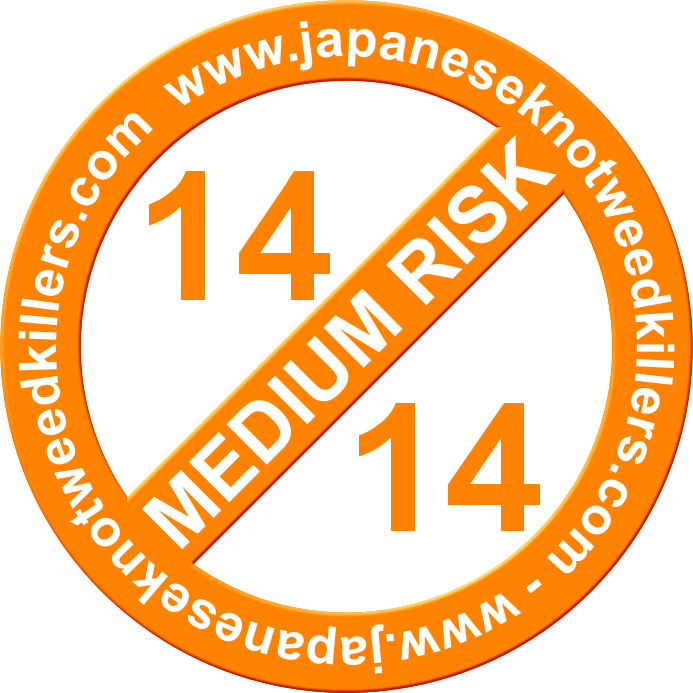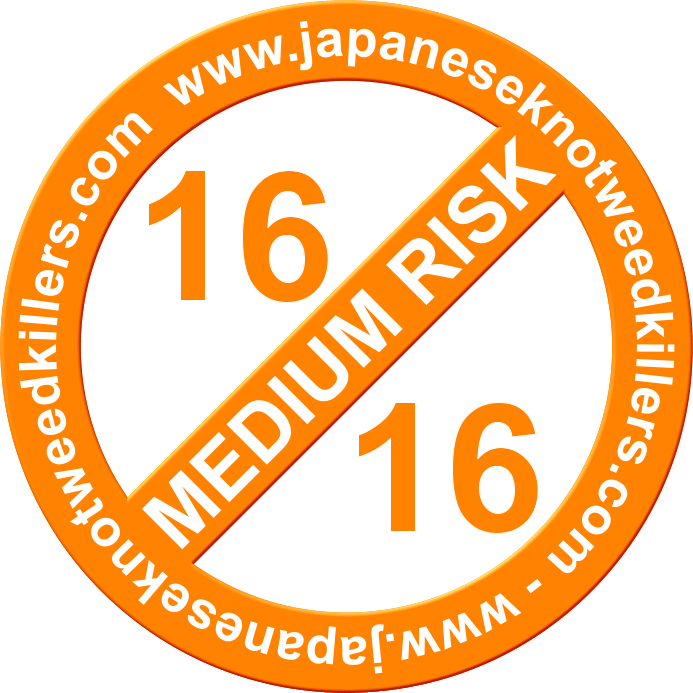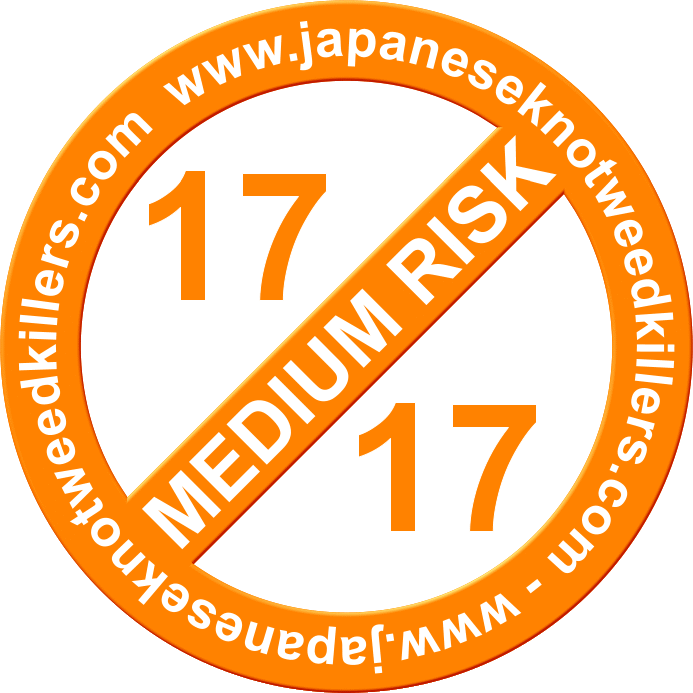

Ireland: Kerry - Dublin - Cork - Waterford - Roscommon - Galway - Belfast
UK: London - Manchester - Newcastle - Cardiff - Liverpool
Non-native Invasive Plant Species Information
Medium Impact / Risk for Ireland




What are Medium Risk / Impact, Alien (non-native) Invasive Plant Species?
In addition to the European Communities (Birds and Natural Habitats) Regulations 2011 - Annex 2 (Part 1) list, Biodiversity Ireland also maintains a list of 'non-native' invasive alien species classifying the impact and risk posed by non-native species in Ireland as 'high risk' and 'medium risk' together with an additional 'watch list'.
Click here to learn more about Biodiversity Ireland's assessment process.
Japanese Knotweed Killers have conducted extensive research and collected detailed information to produce guides for all non-native plant species introduced accidentally or deliberately into the wild where they are not normally found.
Non-native species often out compete native species for natural resources causing adverse impacts on the environment.
Invasive species can also have significant impacts on conservation and economic interests and may in some cases pose threats, directly or indirectly, to human safety.
Reversing the damage of invasive species is a significant land management issue for public authorities as well as for private landowners and can be a costly and labour intensive exercise.
Is Having An Invasive Species On My Property Illegal?
Generally having any invasive species listed under annex 2 of the S.I. No. 477/2011 - European Communities (Birds and Natural Habitats) Regulations 2011, on your property does not break the law.
Allowing any recognised (currently 35 - see below) invasive species to spread outside your property is another matter.... You could be liable for damages, legal costs and remedial costs if you allow an invasive species onto your neighbour's property or public / local authority area.
Non-native species subject to restrictions under EC Regulations 49 and 50
Click on a species from the following list to find out more
-
American Skunk-Cabbage - Lysichiton americanus
-
Red Alga - Grateloupia doryphora
Species Common Name - Scientific Name
#
Record A Sighting
Non-Native Plant Species identified as High Risk on Ireland's Biodiversity List...
Common name
Species name
Fallopia x bohemica
Elodea canadensis
Prunus laurocerasus
Gunnera tinctoria
Spartina anglica
Lagarosiphon major
Hydrocotyle ranunculoides
Nymphoides peltata
Heracleum mantegazzianum
Fallopia sachalinensis
Impatiens glandulifera
Carpobrotus edulis
Undaria pinnatifida
Fallopia japonica
Crassula helmsii
Elodea nuttallii
Myriophyllum aquaticum
Rhododendron ponticum
Ludwigia grandiflora
Sargassum muticum
Environment
Terrestrial
Freshwater
Terrestrial
Terrestrial
Marine
Freshwater
Freshwater
Freshwater
Terrestrial
Terrestrial
Terrestrial
Terrestrial
Marine
Terrestrial
Freshwater
Freshwater
Freshwater
Terrestrial
Freshwater
Marine
Risk score
20
19
18
19
18
19
21
20
19
18
18
19
19
20
20
19
20
20
20
18
Additional Non-Native Plant Species identified as Medium Risk on Ireland's Biodiversity List...
Common name
Brazilian waterweed
Canadian-fleabane
Clover broomrape
False acacia
Garden lupin
Giant rhubarb
Hairy rocket
Himalayan honeysuckle
Himalayan knotweed
Holm oak
Pampas grass
Pitcherplant
Red oak
Rock cotoneaster
Salmonberry
Sycamore
Three-cornered garlic
Traveler's-joy
Species name
Oxalis pes-caprae
Lysichiton americanus
Ambrosia artemisiifolia
Antithamnionella ternifolia
Berberis vulgaris
Ribes nigrum
Egeria densa
Conyza canadensis
Orobanche minor
Campanula rapunculoides
Codium fragile ssp. tomentosoides
Pseudotsuga menziesii
Solidago gigantea
Robinia pseudoacacia
Thlaspi arvense
Lupinus polyphyllus
Gunnera manicata
Erucastrum gallicum
Leycesteria formosa
Persicaria wallichii
Quercus ilex
Berberis thunbergii
Lonicera japonica
Rosa rugosa
Euphorbia esula
Lemna minuta
Crocosmia x crocosmliflora
Senecio inaequidens
Acaena ovalifolia
Matteuccia struthiopteris
Cortaderia selloana
Sarracenia purpurea
Quercus rubra
Botrylloides violaceus
Cotoneaster horizontalis
Prunus serotina
Fallopia baldschuanica
Rubus spectabilis
Hippophae rhamnoides
Acer pseudoplatanus
Allium triquetrum
Clematis vitalba
Ailanthus altissima
Quercus cerris
Parthenocissus quinquefolia
Bunias orientalis
Azolla filiculoides
Pastinaca sativa
Environment
Terrestrial
Terrestrial
Terrestrial
Marine
Terrestrial
Terrestrial
Freshwater
Terrestrial
Terrestrial
Terrestrial
Terrestrial
Marine
Terrestrial
Terrestrial
Terrestrial
Terrestrial
Terrestrial
Terrestrial
Terrestrial
Terrestrial
Terrestrial
Terrestrial
Terrestrial
Terrestrial
Terrestrial
Terrestrial
Freshwater
Terrestrial
Terrestrial
Terrestrial
Terrestrial
Terrestrial
Terrestrial
Terrestrial
Marine
Terrestrial
Terrestrial
Terrestrial
Terrestrial
Terrestrial
Terrestrial
Terrestrial
Terrestrial
Terrestrial
Terrestrial
Terrestrial
Terrestrial
Freshwater
Terrestrial
Risk score
14
15
17
15
14
14
17
17
14
17
16
16
15
14
17
17
17
16
17
14
16
14
14
15
14
16
14
15
16
14
14
14
14
14
14
14
17
14
14
14
15
15
17
17
14
16
15
14
15

